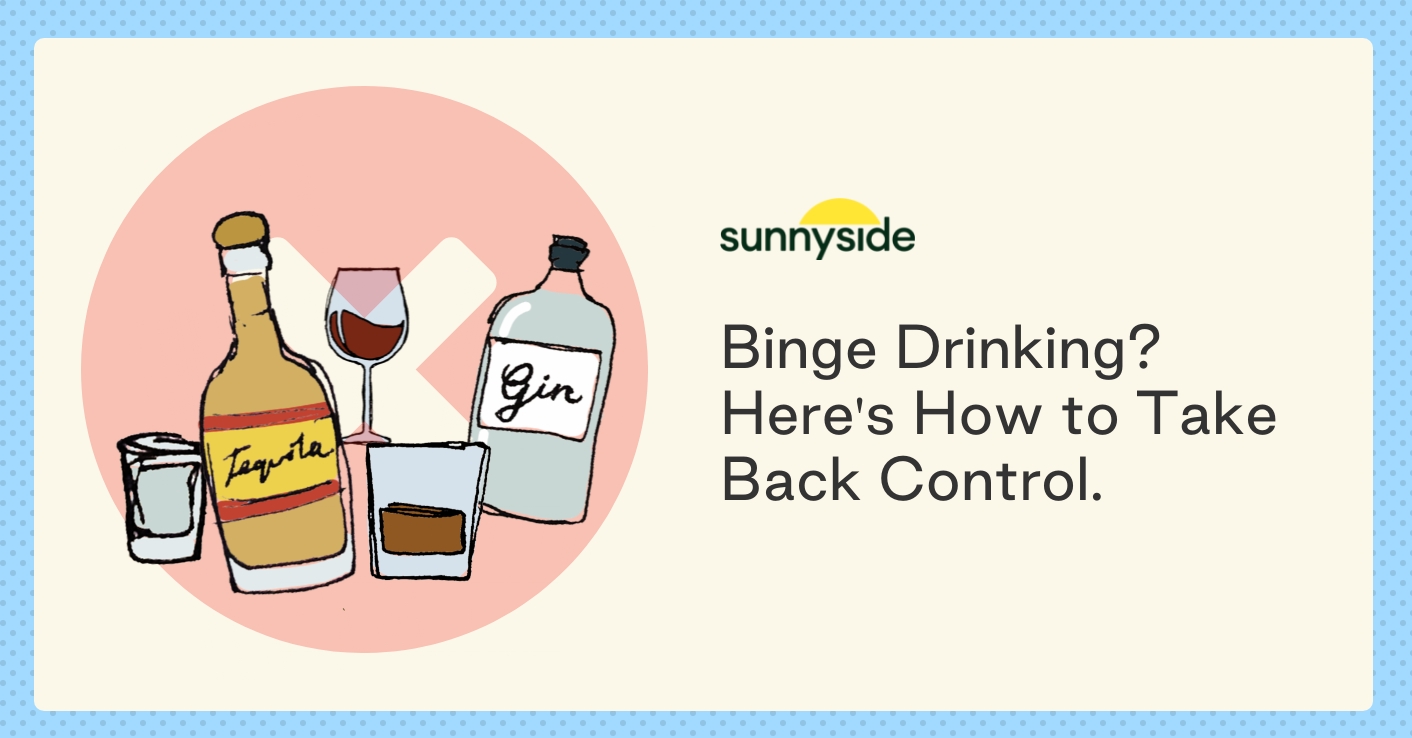Drinking Excessively? Here’s How to Gain Control Over Binge Drinking

BY ANISHA RAO
This article was first published by MM Champion Sponsor, Sunnyside. Check out more of their informative blogs and the app you’ll hear our members chatting about in our communities at Sunnyside.co
What is Binge Drinking?
One of the most common alcohol-related problems that affect people of all ages is binge drinking. Binge drinking is defined as drinking “a harmful amount of alcohol in one session of drinking.” What constitutes a harmful amount varies based on gender and the type and size of the drink.
For females, binge drinking is generally considered four or more standard drinks in one sitting. For males, this is increased to five or more.
A sitting is usually considered a window of two hours or less. This is because, in this time frame, the body does not have adequate time to process the amount of alcohol consumed within such a short window.
It is also important to address the phrase “standard drink” as it means different things depending on the type of alcohol. In the United States, a standard drink consists of 0.6 ounces of pure alcohol.
- Most domestic beers are 5% alcohol. A standard beer is 12 ounces.
- 5-ounces of wine contains 12% alcohol.
- Malt liquor usually consists of 7% alcohol. A standard drink is between 7 and 8 ounces.
- Spirits such as gin, vodka, whiskey, or brandy contain approximately 40% alcohol. In this case, a standard drink (or shot) is 1.5 fluid ounces.
When you order a drink in a bar or restaurant, they are not obligated to, nor do they typically conform to a standard serving size for their drinks. So, if you order a mixed drink with dinner, it may contain as much as three times the alcohol found in one standard drink.
When people discuss drinking, they are often referring to binge drinking, heavy drinking, or excessive drinking. Often these terms are used interchangeably.
Binge Drinking
Binge drinking is frequently associated with younger adults, especially those in college. As drinking has seemingly become a ritual of the higher education experience, almost 53% of full-time college students ages 18 to 22 drank alcohol in the past month; 33% binge drank.
While young adults and college students are statistically more likely to report binge drinking, it is essential to clarify that binge drinking is not restricted to a specific age group or demographic.
According to the National Institute on Alcohol Abuse and Alcoholism, nearly 5% of youth under age 17 and 10% of adults over age 65 engaged in binge drinking in the past month. One in six US adults binge drink and at least 25% do so weekly. 25% of US adults who binge drink consume at least 8 drinks during a binge drinking episode.
What is Considered Excessive Drinking?
As we have reviewed, the term excessive drinking is a term used to describe various types of problematic drinking, including binge drinking and heavy drinking.
While excessive drinking is the term used to describe different types of “drinking too much,” there are more definitive differences between binge drinking and heavy drinking.
Binge drinking is explicitly defined as “a pattern of drinking that brings your blood alcohol concentration to .08 or above.” For men, binge drinking is often the pattern of consuming 5 or more drinks in about 2 hours; 4 or more drinks in 2 hours for women.
For men, heavy drinking is typically referred to as consuming at least 15 drinks per week. Female heavy drinking consists of at least 8 drinks per week. Frequently engaging in heavy drinking significantly increases one’s risk for long-term challenges related to excessive or problem drinking.
There are many medical conditions that are linked directly to frequent episodes of binge drinking.
What are Binge Drinking Effects?
Binge drinking has both short and long-term effects on your physical and emotional health. Some of the effects of binge drinking are felt within the first five to ten minutes as the alcohol is quickly absorbed into blood.
Because alcohol is entirely legal to use, many people forget alcohol is a potent substance and can lead to significant challenges when consumed too frequently or excessively.
When your body begins the work of “getting rid” of alcohol, most of the work- nearly 90 percent- is done by your liver. Your lungs, kidneys, and other body systems help remove the remaining ten percent. Our liver can only break down about one standard drink per hour. When you binge drink, you consume more alcohol than your liver can process, leading to a higher blood alcohol content (BAC) and other effects on the body.
Binge Drinking Bruises Our Body
In the short term, a single night of binge drinking, especially in high amounts, can have several impacts on many vital body systems. Consuming more alcohol than your liver can adequately process can cause inflammation and organ irritation. But the physical effects of binge drinking extend beyond the liver.
Heavy drinking or multiple episodes of binge drinking in a short period can affect your blood pressure and heartbeat. It can also cause dehydration and problems with your kidneys as they try to regulate vital levels of certain nutrients and minerals in your body.
Alcohol also affects your body’s blood sugar levels, so if you have diabetes, binge drinking may add to challenges for your body when it comes to regulating your blood sugar.
Most of these effects are short-term effects. Therefore, after a night of binge drinking, most of them will resolve on their own. However, recurring episodes of binge drinking are likely to lead to long-term health problems, including long-term liver damage and disease. Additionally, research shows that long-term problematic drinking increases one’s risk for several cancers5, including those of the mouth, colon, and liver.
Binge Drinking Hurts Our Hormones
The effects of binge drinking go beyond physical challenges and, with time, may impact your emotional health as well. Regular, heavy drinking affects how your brain functions.
Specific chemicals in the brain, such as dopamine and serotonin, are responsible for various emotions that contribute to mental health. After one drink, the brain releases more dopamine (more than “normal”), and feelings of joy, calm, and relaxation occur.
In time with excessive drinking, however, the levels of dopamine you need to “feel good” increase, and your brain cannot release enough to keep up with what alcohol produces. This can lead to the opposite effect. When your brain doesn’t get enough dopamine, it can lead to feelings of sadness, anxiety, and difficulties managing stress.
Binge Drinking Challenges Our Cognition and Social Interactions
Frequent binge drinking may also impact how your brain functions. Studies suggest that regular binge drinking can lead to cognitive challenges like memory loss, difficulties with learning, and other struggles with brain functioning.
Binge drinking may also affect how you interact with and socialize with others. Because alcohol tends to reduce inhibitions, you may find you are far more “open” when binge drinking than you would be otherwise.
While this can be beneficial under certain circumstances, you may also experience challenges. Cutting back on alcohol and drinking in moderation may allow you to feel the same reduced worry but without some of the other effects that accompany binge drinking.
How to Stop Binge Drinking and Replace it with Mindful Drinking?
There are various reasons why people binge drink, but several strategies can help you continue to progress towards a healthier lifestyle. First, it can be helpful to change your environment. Think about where you are and who you spend most of your time with when you binge drink.
If you are constantly reminded of drinking, it can be challenging to cut down. It may be helpful to avoid bars or restaurants that you associate with drinking, as these triggers often lead you to consume alcohol even if you don’t want to.
In addition to potential medical, emotional, and social harms, consider how else can reducing the amount you drink improve your overall health and well-being? It is beneficial to return to your list often, especially when you feel particularly triggered to drink.
Also, consider the people you are with when you engage in binge drinking. This will help you better understand your “why.” It can also help you find and put into place different tools you can use to reduce binge drinking.
Explore healthy alternative coping mechanisms. Many people who binge drink do so to cope with negative feelings, such as anxiety and stress or manage pain. Studies show that women reported 41% more heavy drinking days during 2020’s challenging pandemic days as compared to in 2019. Also, according to the Anxiety & Depression Association of America, 20% of the people with social anxiety disorder also suffer from alcohol abuse or dependence.
If you experience mental health challenges or chronic pain, consider trying self-care practices such as mindful meditation, yoga, or an enjoyable hobby. You can also turn to support systems like Sunnyside for peer support and help with ways to explore a healthier relationship with drinking.
Another helpful tool to stop binge drinking is to enlist the support of family and friends to help you cut down on your alcohol use. Not only will your loved ones provide praise when you do well, but they may also help to provide a reality check when you choose alcohol over a non-alcoholic beverage.
Mindful Drinking
Create a plan to help you develop a more mindful drinking relationship. Part of the planning process should include all of the reasons why it is important to you to reduce the amount of alcohol you drink.
Just like how we track our calories, steps, and women track menstrual cycles, we should be tracking our drinks just as commonly. Whether you prefer to simply keep tabs on your alcohol consumption or cut back, building mindfulness by tracking is key.
Sunnyside leverages proven behavioral psychology strategies to help you enjoy drinking, while limiting the negative effects of over consuming. You will become more mindful and empowered to achieve healthy lifestyle goals, especially outcome-based healthier drinking goals.
Your Sunnyside coach will offer proven personalized mindful drinking recommendations and targets for each week and help you customize the plan to align with your schedule and preferences.
Easily track each drink by sending a text with an emoji or number as your Sunnyside Coach cheers you on and encourages you about the day’s target.
Celebrate your achievements of more mindfully drinking, saving money, reducing your load of empty calories, dry days, and drinks you reduce.
Visualize your progress and learn more about your drinking patterns over time.
Crafty Mocktails
Instead of consuming multiple alcoholic beverages when you are out with friends, consider non-alcoholic alternatives or mocktails. With the rise of mindful drinking as a popular alternative to excessive alcohol consumption, many beer and alcohol companies added non-alcoholic options to their popular beverage lineups.
Mocktails or popular cocktail drinks without alcohol are not all that different in taste from your favorite alcohol beverages. The best part about non-alcohol alternatives or mocktails is that you can drink as many as you want without experiencing the side effects of heavy drinking.
Why Drink in Moderation?
A precise definition of “moderate drinking” is challenging to find. However, most would consider moderate drinking to be between one and two drinks per day for men and no more than one per day for women8. Although drinking in moderation does not entirely eliminate potential risks connected to alcohol, it does reduce their impact.
In order to truly transform, maintain even during challenging times, or bounce back if we do revisit our previous ways, we must understand our unique why. Your why is what you feel in your mind and heart. Dig five “Why” levels deep to understand your root.
In addition to your WHY, drinking in moderation can profoundly impact your bio psychosocial health and wellness.
Healthy Weight
First, drinking in moderation helps reduce weight gain. One average serving of alcohol contains between 100 and 150 calories. In fact, ethanol, which is one of the active ingredients in alcohol, is recognized as the second most calorie-dense nutrient after fat.
Mixed drinks that include other components like milk, juice, syrups, or soda are generally higher. That said, binge drinking may add more than 500 calories to your daily intake. In time, this can increase the chances of weight gain connected to drinking.
Also, people’s diet tends to change when drinking alcohol. In a social setting, you are more likely to eat snack foods or foods that taste well with alcohol, such as pub foods (wings, fries, onion rings, etc.) and salty snacks (chips, nuts, pretzels). These food items are also high in calories and fats. Adding calories from food coupled with the added calorie intake from alcohol makes unwanted weight gain possible.
Cognition and Emotional Wellness
Studies suggest that moderate drinking may reduce your risk for certain cognitive impairments like dementia. Because small amounts of alcohol are believed to make your brain cells “more fit”, healthy alcohol doses may help improve cognitive function in both short and long-term ways.
Moderate alcohol consumption may also improve your emotional wellness and reduce stress. Studies into the psychological effects of alcohol suggest that those who consume low to moderate amounts of alcohol reported increased feelings of happiness, euphoria, and pleasant carefree feelings associated with psychological well-being.
Tension, depression, and self-consciousness decrease with equal doses. These improved emotions were also accompanied by decreased tension and reduced feelings of self-consciousness. Those who engage in regular binge or heavy drinking actually report greater rates of emotional challenges than those who engage in moderate drinking.
Better Sleep
Binge drinking and heavy drinking affect the quality of your sleep. Although alcohol does have a sedative effect, ongoing heavy use of alcohol will inevitably impact your ability to fall and stay asleep. Cutting back to a moderate amount of alcohol may help improve not only your ability to sleep but the quality of your sleep. This is important for your overall health as our bodies use the hours during which we are asleep to heal and restore. In the absence of sleep, you are at a greater risk for various medical and emotional ailments.
Lower Your Blood Pressure
Binge drinking can increase your blood pressure after just one occurrence. However, ongoing or repeated binge drinking can lead to long-term increases in your blood pressure. Cutting back from heavy drinking to moderate drinking can lower your blood pressure, help you maintain a healthier weight, and minimize the effects that can occur when alcohol interacts with certain blood pressure and other medications.
Anti-Age Your Skin
Heavy alcohol consumption can have a variety of effects on your skin. Alcohol can lead to dryness and problems with your complexion and cellular repair. Heavy drinking, especially in women, can increase visible signs of early aging, including under fine lines, sunspots, eye puffiness, and reduced facial volume. Reducing the number of drinks you have or alternating alcoholic beverages with non-alcoholic alternatives (such as water or soda) can help limit the impacts of alcohol on your skin.
As mentioned above, the liver is the workhorse of your body when it comes to eliminating alcohol from your system. Frequent heavy or binge drinking taxes the liver. Although moderate drinking still requires the liver to process alcohol, the speed at which alcohol enters your system when you drink in moderation is more manageable for the liver.
How to Explore a Healthier Drinking Relationship
So how do you become more mindful? What’s that special alcohol number to enjoy without the serious harmful effects?
It is not necessary to abstain from drinking to develop a healthier relationship with alcohol. At Sunnyside, our text-based tracking app is designed to help you better understand how to embrace your power over excessive drinking and alcohol. We are here to help you enjoy feeling good about going out and living your best life while waking up tomorrow and shining like the star you are.
Our focus on mindful drinking at Sunnyside means we promote a judgment-free way to learn about the benefits of mindful drinking. We aren’t here to teach you how to stop but instead how to develop safe and healthy lifestyle habits and goals.
We understand that everyone’s needs are unique, and therefore we adapt solutions to accommodate your lifestyle. Our science backed approach to habit forming and modification has helped our members achieve balance, happiness, and a healthier relationship with drinking.
Get started on your healthier drinking journey with a 3-minute Diagnostic Assessment about yourself and your goals so we can personalize your experience and plan. Cheers to a lifestyle transformation with new daily routines and more mindful drinking.
Get Started with Sunnyside for Free

Anisha Rao, MPP is a Healthcare Consultant and Wellness Educator who has in-depth healthcare industry knowledge and subject matter expertise about mindful living, health, and wellness. She has earned a Bachelor of Arts in Psychology, a Bachelor of Arts in Health Administration and Policy, a Master of Public Policy, a Minor in Management of Aging Services, and is a Certified Lean Six Sigma Greenbelt Healthcare Professional. With over a decade of professional healthcare experience, she has gained the necessary expertise to passionately educate people of all ages and backgrounds about a mindful, holistic bio psychosocial approach to health and wellness. She also understands that navigating the modern healthcare and care support system can be complicated so she creates resources to guide families about how they can identify the best personalized care services that are suited for them.

Totally agree. Binge drinking has damaging influences on a young person’s brain. Their brain is still learning to transmit information quickly and process the realities of a more adult world and mixing this with alcohol can have devastating effects.